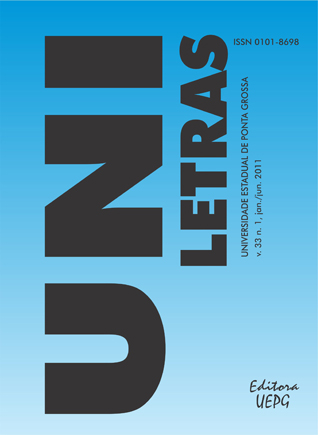“Gripe hespanhola”, morte e subjetividade na Estrada Perdida, de Telmo Vergara. Doi: 10.5212/Uniletras.v.33i1.0011
DOI:
https://doi.org/10.5212/uniletras.v33i1.3555Palavras-chave:
Literatura. Subjetividade. Morte.Resumo
O objetivo deste trabalho é analisar como aparece a temática da morte, bastante recorrente na obra do escritor gaúcho Telmo Vergara, num de seus principais livros: o romance Estrada Perdida, publicado originalmente em 1939, pela Editora José Olympio. O enredo se desenrola no período entre-guerras, incluindo o ano de 1918, quando ocorreu em todo o mundo a famosa epidemia da gripe “hespanhola”, que vitimou milhares de pessoas em todas as regiões de nosso país, inclusive em Porto Alegre, onde se passa a história. O romance tem como personagem central Luís, mostrando-o desde sua infância, no pós 1ª Guerra, até sua fase adulta, já quase na 2ª Guerra Mundial. O foco de Vergara é a análise da subjetividade das personagens, sendo o autor um dos pioneiros na utilização das técnicas de representação literária do fl uxo de consciência no Brasil, muito antes de escritores consagrados nesse tipo de narrativa serem traduzidos em nosso país (caso de Virginia Woolf e James Joyce) e da popularização da literatura intimista a partir da obra de Clarice Lispector.
Palavras-chave: Literatura. Subjetividade. Morte.
Downloads
Downloads
Publicado
Edição
Seção
Licença
Autores que publicam nesta revista concordam com os seguintes termos:
a) Os autores mantém os direitos autorais e concedem à revista o direito de primeira publicação, com o trabalho simultaneamente licenciado sob a Creative Commons Attribution License que permite o compartilhamento do trabalho com reconhecimento da sua autoria e publicação inicial nesta revista.
b) Esta revista oferece acesso livre imediato ao seu conteúdo, seguindo o princípio de que disponibilizar gratuitamente o conhecimento científico ao público proporciona maior democratização mundial do conhecimento. Para maiores informações sobre esta abordagem, visite Public Knowledge Project, projeto que desenvolveu este sistema para melhorar a qualidade acadêmica e pública da pesquisa, distribuindo o OJS assim como outros softwares de apoio ao sistema de publicação de acesso público a fontes acadêmicas. Os nomes e endereços de e-mail neste site serão usados exclusivamente para os propósitos da revista, não estando disponíveis para outros fins.

This work is licensed under a Creative Commons Attribution 4.0 International License.





